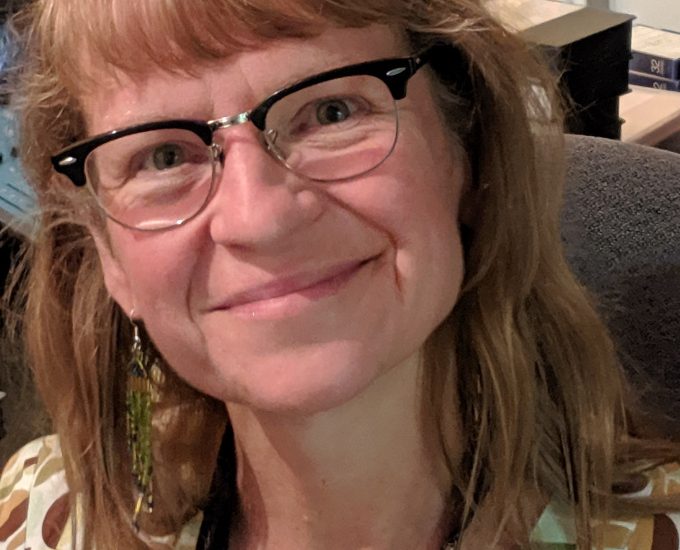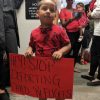
KJIPUKTUK (Halifax) – Video reporter Angel Moore joined the Aboriginal Peoples Television Network (APTN) in June 2018, fresh out of the Kings one-year Bachelor of Journalism program.
APTN is a media organization unlike any other. For the last 20 years APTN has been providing Indigenous programming of all kinds, in English and many aboriginal languages. APTN journalists cover news, current events and do special investigations nation-wide. They’re very good at news reporting that affects Indigenous peoples.
To find out what water defenders are up to in Mi’kma’ki or at Muskrat Falls in Labrador I often find myself seeking out the reporting by Moore and fellow APTN journalists Justin Brake (now stationed in Ottawa) and investigative reporter Trina Roache.
See also: All I am guilty of is being where the story was. Reporter Justin Brake on facing criminal charges
I spoke with Angel about doing Indigenous journalism, what makes working for APTN different, and writing for community.
This interview is the fourth in a series. I hope to offer more interviews on the state of journalism in Nova Scotia all through the summer.
How did you become a journalist working for APTN?
I always tell people that I fell into journalism. My family is from Peguis First Nation, which is a Cree First Nation in Manitoba.
I went to the University of Manitoba; I took a program for Indigenous students to pursue medicine. But I came to realize that medicine is more of a social issue. So I came to Dalhousie and enrolled at its Department of International Development Studies.
I graduated, and then I wasn’t sure which direction to go. I knew that all those issues I had studied happen not just in some remote country, but here at home, in Indigenous communities, and I wondered how to get the word out about how people really lived their lives. I was always a good writer, and somebody suggested journalism, and I ended up taking the one year journalism course at Kings.
It’s very good. It focuses really on the stuff you need to hit the ground walking. And you sink or swim. I graduated. And I think before the convocation, I had an interview with APTN. A couple days later I got hired full time. I was very shocked, and very happy.
You cover a large area. How do you like being a journalist, traveling Atlantic Canada?
The best part is is that I get to visit communities. When I’m visiting a community, whether it’s in Labrador or New Brunswick, PEI, or here in Nova Scotia, or even when I am in Goose Bay talking and visiting with Inuit people, I feel more at home than I do in the city.
In your own mind, who do you write for?
I write for people in communities. When I’m doing the story, I’m writing it for my family and community. It’s interesting, because that approach has an impact. I’m sharing this story from this community with people in other communities. It makes for a wonderful job.
I covered a story where the headlines from other media organizations were negative and stereotypical, and these headlines had nothing to do with what happened. Lots of people probably have a family member who has an addiction. And that was really upsetting because it took away from the story, and it took away from what happened.
But when I’m doing the story myself, I’m thinking of my family members. I still have family who live in the community, most of my relatives live in Peguis. And I’m thinking of the struggles that they’ve experienced.
What’s sometimes missing in news coverage by other media organizations?
I guess what’s missing (in media coverage) too often would be maybe more about the history of issues, why things are the way they are. Because people make assumptions, and then stereotypes arise. These uninformed opinions are made very quickly. So that’s a lot of responsibility to have as a journalist. So if you’re putting something out there I’m very conscious of that. Personally, I can hear in the back of my head things I grew up hearing, people making racist comments.
I think other media outlets need to be more careful or aware of that. So the other media outlets need to be more, I don’t want to say they’re not being responsible, but to be more aware of people’s situations.
It’s important to us to do the positive stories as well. They’re considered just as important as the hard news. I think they are considered that way because of the struggles that people have had.
It’s not my job to change preconceptions. It’s my job to tell stories about the community for the community. However, when I’m writing a story, the potential negative comments and the racist comments on social media are always on my mind. I’m very aware and I’m very careful of that.
I don’t think there is such a thing as Indigenous journalism
Being an Indigenous journalist is the same as being an Indigenous person. You just see the world differently. You see things in a different context, especially when you have family in community
I don’t think there is such a thing as Indigenous journalism, and it’s not my mission to save the world. All it is is just good journalism. And what makes it good journalism is because of the way we’re scrutinized more. It’s as if we’re held to a higher standard, because the criticism is out there.
We’re not just a news outlet, we’re the first Indigenous network in the world, so we have a responsibility to our community members. I have a responsibility to my family. My relatives watch it, my younger sisters and my younger family members, you know, back home.
See also: Panel tackles media bias in reports on immigrant, African Nova Scotian and Mi’kmaq communities
With a special thanks to our generous donors who make publication of the Nova Scotia Advocate possible.
Subscribe to the Nova Scotia Advocate weekly digest and never miss an article again. It’s free!




Her story is very touching I must say.
Her points are well spoken.
Also when Angel Moore said in this story “I think other media outlets need to be more careful or aware of that. So the other media outlets need to be more, I don’t want to say they’re not being responsible, but to be more aware of people’s situations”, I love what she is saying here. As one of the other writers for the Nova Scotia Advocate, I must say what Angle Moore is saying here makes me think more of my Journalism in the advocate. For more on examples of Media Being Considerate of people Situations Click on this “https://nsadvocate.org/author/kendall-worth/” and enjoy reading the various stories.